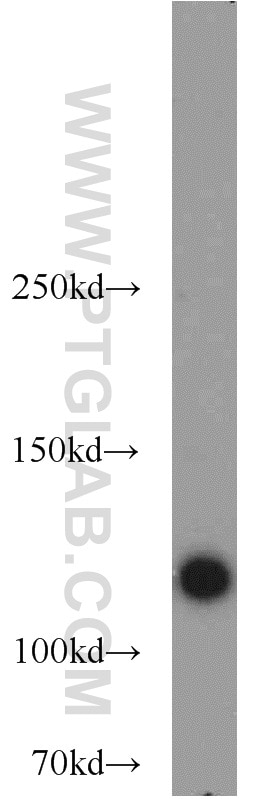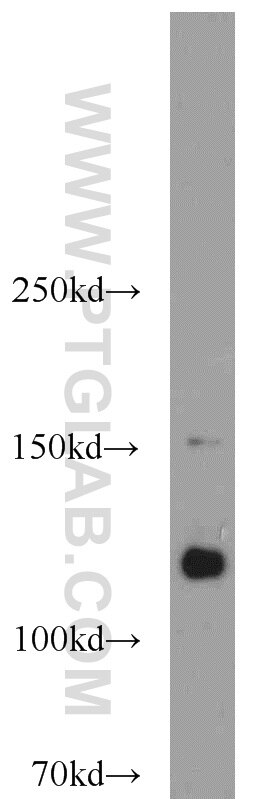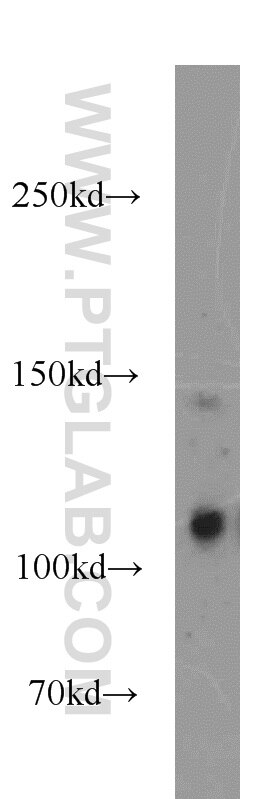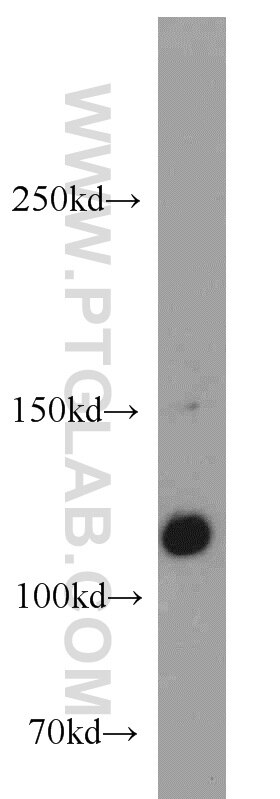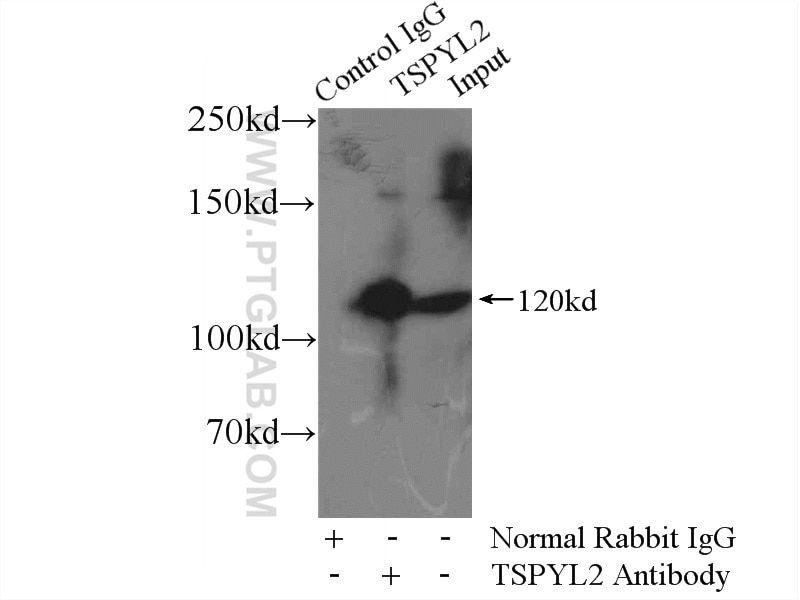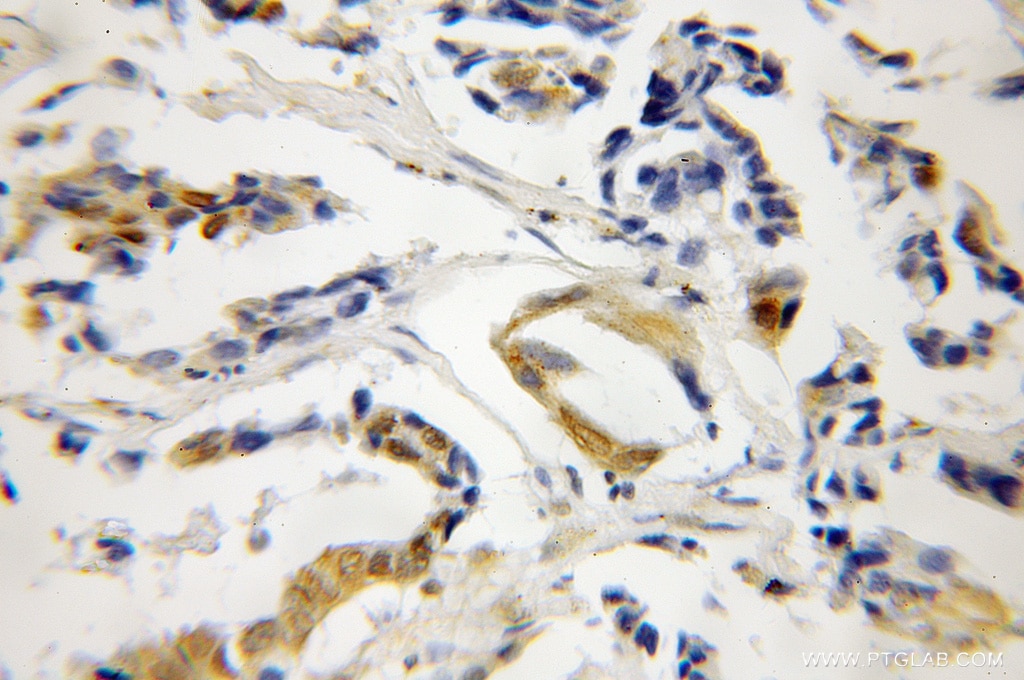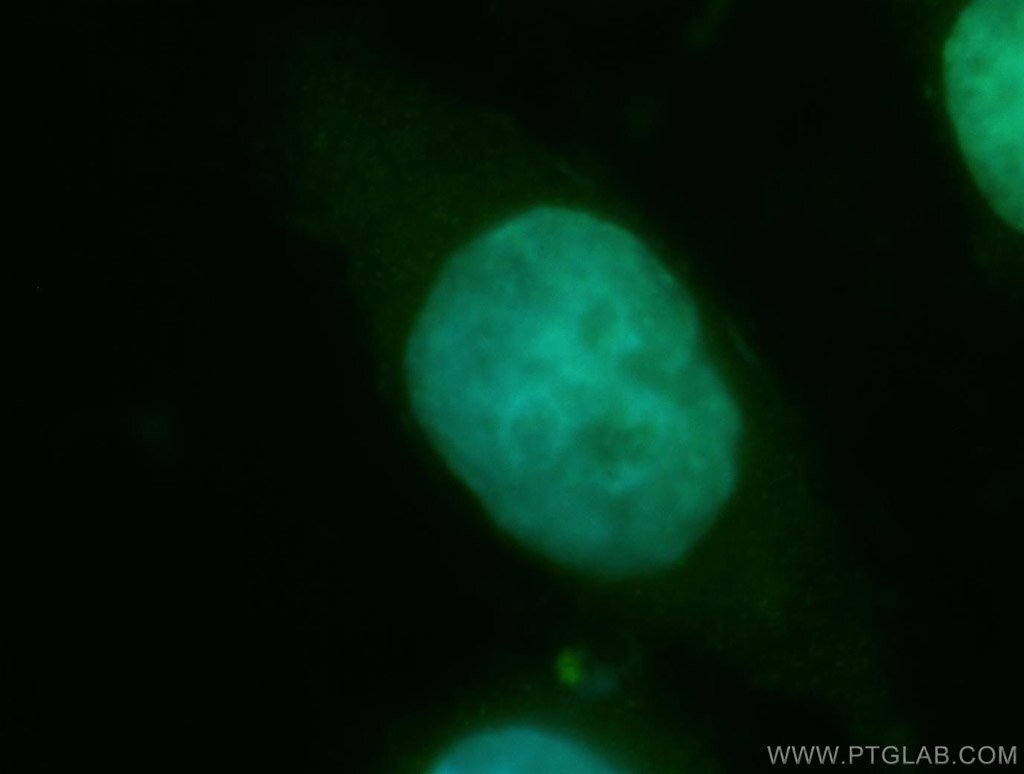Validation Data Gallery
Tested Applications
| Positive WB detected in | HeLa cells, DU 145 cells, HEK-293 cells, MCF-7 cells |
| Positive IP detected in | HEK-293 cells |
| Positive IHC detected in | human lung cancer tissue Note: suggested antigen retrieval with TE buffer pH 9.0; (*) Alternatively, antigen retrieval may be performed with citrate buffer pH 6.0 |
| Positive IF/ICC detected in | Hela cells |
Recommended dilution
| Application | Dilution |
|---|---|
| Western Blot (WB) | WB : 1:500-1:2000 |
| Immunoprecipitation (IP) | IP : 0.5-4.0 ug for 1.0-3.0 mg of total protein lysate |
| Immunohistochemistry (IHC) | IHC : 1:20-1:200 |
| Immunofluorescence (IF)/ICC | IF/ICC : 1:20-1:200 |
| It is recommended that this reagent should be titrated in each testing system to obtain optimal results. | |
| Sample-dependent, Check data in validation data gallery. | |
Published Applications
| KD/KO | See 1 publications below |
| WB | See 8 publications below |
| IHC | See 1 publications below |
| IF | See 2 publications below |
| CoIP | See 2 publications below |
Product Information
12087-2-AP targets CDA1 in WB, IHC, IF/ICC, IP, CoIP, ELISA applications and shows reactivity with human samples.
| Tested Reactivity | human |
| Cited Reactivity | human, mouse |
| Host / Isotype | Rabbit / IgG |
| Class | Polyclonal |
| Type | Antibody |
| Immunogen | CDA1 fusion protein Ag2722 相同性解析による交差性が予測される生物種 |
| Full Name | TSPY-like 2 |
| Calculated molecular weight | 693 aa, 79 kDa |
| Observed molecular weight | 120 kDa |
| GenBank accession number | BC024270 |
| Gene Symbol | CDA1 |
| Gene ID (NCBI) | 64061 |
| RRID | AB_2256811 |
| Conjugate | Unconjugated |
| Form | Liquid |
| Purification Method | Antigen affinity purification |
| UNIPROT ID | Q9H2G4 |
| Storage Buffer | PBS with 0.02% sodium azide and 50% glycerol , pH 7.3 |
| Storage Conditions | Store at -20°C. Stable for one year after shipment. Aliquoting is unnecessary for -20oC storage. |
Background Information
TSPYL2 (also known as CINAP, CDA1, TSPX or DENTT) is a new member of the nucleosome assembly protein superfamily. TSPYL2 binds histones and facilitates nucleosome assembly. TSPYL2 is expressed in various tissues, highly in the pituitary gland and moderately in the adrenals, brain, testis, and ovary. Immunohistochemical staining analysis for TSPYL2 showed differential cytoplasmic and nuclear staining patterns in several cell types. Downregulated expression of TSPYL2 has been observed in several tumors, which suggests its role as a tumor suppressor. Although it is predicted that TSPYL2 has a molecular mass of 79.43 kDa, it is found that mammalian TSPYL2 appears at a size of 120 kDa by western blot analysis. The abundant acidic amino acid regions in TSPYL2 may cause its aberrant migration. In addition, the TSPYL2 protein is unstable and sensitive to proteasomal degradation.
Protocols
| Product Specific Protocols | |
|---|---|
| WB protocol for CDA1 antibody 12087-2-AP | Download protocol |
| IHC protocol for CDA1 antibody 12087-2-AP | Download protocol |
| IF protocol for CDA1 antibody 12087-2-AP | Download protocol |
| IP protocol for CDA1 antibody 12087-2-AP | Download protocol |
| Standard Protocols | |
|---|---|
| Click here to view our Standard Protocols |
Publications
| Species | Application | Title |
|---|---|---|
Cell Glioma stem cell proliferation and tumor growth are promoted by nitric oxide synthase-2. | ||
Cell Death Differ TSPYL2 is an essential component of the REST/NRSF transcriptional complex for TGFβ signaling activation.
| ||
PLoS One The X-linked tumor suppressor TSPX interacts and promotes degradation of the hepatitis B viral protein HBx via the proteasome pathway. | ||
Stem Cells Int Expression of Genes Related to Germ Cell Lineage and Pluripotency in Single Cells and Colonies of Human Adult Germ Stem Cells. | ||
Oncotarget The X-linked tumor suppressor TSPX downregulates cancer-drivers/oncogenes in prostate cancer in a C-terminal acidic domain dependent manner. | ||
J Ginseng Res Ginsenoside Rg3 increases gemcitabine sensitivity of pancreatic adenocarcinoma via reducing ZFP91 mediated TSPYL2 destabilization |
